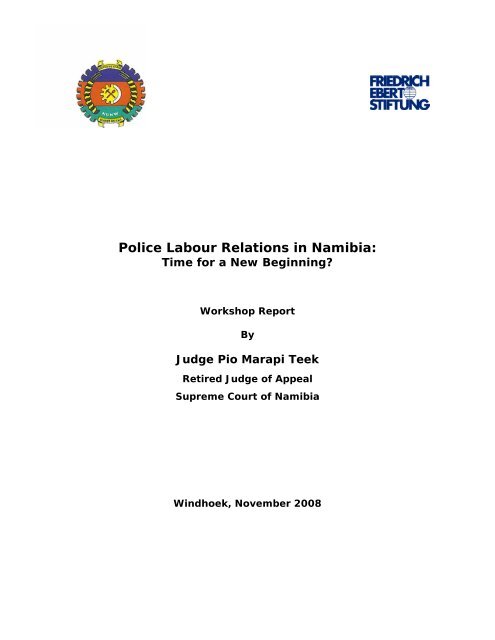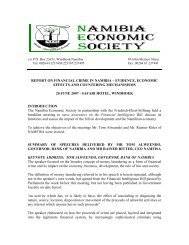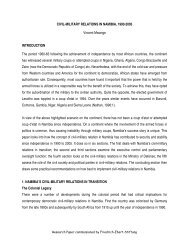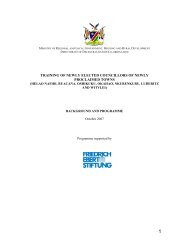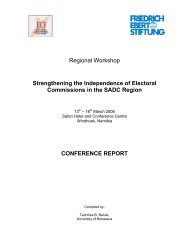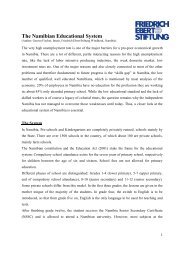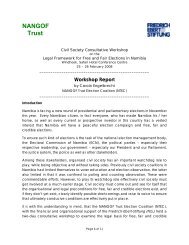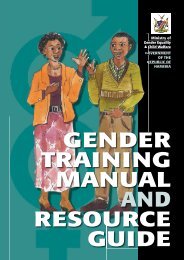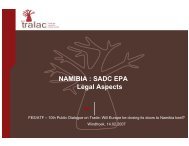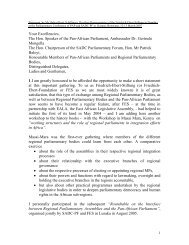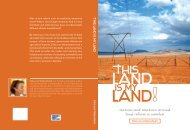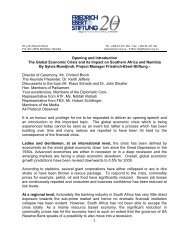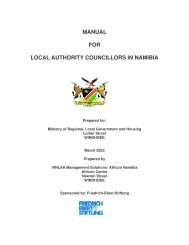Report - Friedrich Ebert Stiftung - Namibia
Report - Friedrich Ebert Stiftung - Namibia
Report - Friedrich Ebert Stiftung - Namibia
Create successful ePaper yourself
Turn your PDF publications into a flip-book with our unique Google optimized e-Paper software.
Police Labour Relations in <strong>Namibia</strong>:<br />
Time for a New Beginning?<br />
Workshop <strong>Report</strong><br />
By<br />
Judge Pio Marapi Teek<br />
Retired Judge of Appeal<br />
Supreme Court of <strong>Namibia</strong><br />
Windhoek, November 2008
Workshop <strong>Report</strong> on Police Labour Relations in <strong>Namibia</strong>: Time for a New Beginning?<br />
Table of Contents<br />
Foreword<br />
i<br />
<strong>Report</strong> of the Workshop<br />
1. Introduction and Opening Remarks 1<br />
2. Keynote Address and Official Opening 2<br />
3. Police Labour Relations in South Africa 4<br />
3.1. Trade Union View 4<br />
3.2. Police Management View 5<br />
3.3. Collective Bargaining 7<br />
3.3.1. Establishment of SSSBC 7<br />
3.3.2. Parties to the Council and its Objectives 8<br />
3.3.3. Powers and Functions 8<br />
3.3.4. Dispute Resolution 8<br />
3.3.5. Mechanisms of Resolving Disputes 9<br />
4. Police Labour Relations in the Region 10<br />
4.1. The Case of Swaziland – A Trade Union View 10<br />
4.2. The Case of Lesotho – A Staff Association View 12<br />
5. Correctional Labour Relations 12<br />
5.1. Swaziland Trade Union View 12<br />
5.2. The <strong>Namibia</strong>n Trade Union View 12<br />
6. Panel Discussion: Current State and Challenges 15<br />
6.1. Plenary Session 15<br />
6.2. Grievance Procedures in the South African Police Force 16<br />
6.3. Suggestions 17<br />
7. Workshop Recommendations 18<br />
8. Closing Ceremony 19<br />
Page ii
Workshop <strong>Report</strong> on Police Labour Relations in <strong>Namibia</strong>: Time for a New Beginning?<br />
Foreword<br />
The Consultative Workshop on: The Police and Correctional Services Labour<br />
Relations in <strong>Namibia</strong>. “Time for a New Beginning” Hosted by the National Union<br />
of <strong>Namibia</strong>n Workers (NUNW) and its Partners was held in Windhoek at the<br />
Safari Court Hotel from 23-24 September 2008.<br />
I gladly accepted the NUNW’s invitation as a full participant and to preside as<br />
chairman over the proceedings of the 4 th session as well as the overall workshop<br />
rapporteur. I therefore, have great pleasure in presenting this concise report.<br />
The ultimate purpose of the workshop was primarily to consult and to understand<br />
the limitations imposed on Police Officers and the employees of the Prison and<br />
Correctional Services by the restrictive and prohibitive nature of the Labour Act<br />
as well as the Regulations passed under the Police, Prison and Correctional<br />
Services and, City Police Acts, relating to the rights of these groups of employees<br />
to freely associate, i.e form or belong to a trade union of their choice.<br />
The objective of this exercise was the union’s desire to establish a trade union<br />
organization for these aforementioned groups of employees after such<br />
consultations and having drawn specific lessons from the experiences of its<br />
International colleagues and friends. This objective is most challenging as it has<br />
to be tested against the applicable provisions of the liberal <strong>Namibia</strong>n Constitution,<br />
National legal instruments and international Conventions ratified by <strong>Namibia</strong>.<br />
The Workshop was an historic one in that it challenged deep-rooted views and<br />
entrenched positions held by the different stakeholders in respect of the issues<br />
pertaining to labour relations in these forces. This was evident in the, at times<br />
lively discussions that showed that there were differences between the<br />
immediate concerns of the Police managers and the unionists. As the great<br />
Page iii
Workshop <strong>Report</strong> on Police Labour Relations in <strong>Namibia</strong>: Time for a New Beginning?<br />
liberal sociologist, Max Weber, pointed out that we are called upon in life to serve<br />
different goals. The goals of political action rest on values different from those of<br />
scholarly reflection and direct us to give priorities to different obligations.<br />
However, activist and “managers” do not inhabit different worlds.<br />
The workshop itself was clear evidence of that as the participants were resolute<br />
at its conclusion that the legal challenges and reservations expressed by some<br />
were not their strong weakness but rather a weak strength in the campaign that<br />
needs to be worked on and improved in order to effect a change of the<br />
authorities’ mindset. This positive attitude is buttressed by the Hon. Minister of<br />
Labour and Social Welfare’s preparedness to explore together with the<br />
stakeholders how to take the discussion forward in the “quest to find better living<br />
conditions for all our people” (emphasis mine). As different issues were raised<br />
some important issues were inevitably overshadowed by others in discussions.<br />
Some of the stakeholders who were invited to participate in the panel discussion<br />
regarding “The Police and Correctional Services Labour Relations in<br />
<strong>Namibia</strong>: Current State and Challenges and Time for a New Beginning” did<br />
not show up and did not deputize anyone in their place and those whose papers<br />
were read on their behalf failed to avail copies of their papers. It was further<br />
regrettable that a representative of the International Labour Organization (ILO)<br />
from Pretoria who was expected to present a paper on International<br />
Requirements and Good Practices for Representation and Collective Bargaining<br />
in the Police Force and Prison Services failed to turn up.<br />
Furthermore, the finalization of this report was delayed by the failure of some<br />
presenters to avail copies of their discussion papers despite strenuous efforts by<br />
the secretariat and a grace period of several weeks. The <strong>Report</strong>s is therefore,<br />
deprived of the benefits of these relevant reference documents.<br />
Page iv
Workshop <strong>Report</strong> on Police Labour Relations in <strong>Namibia</strong>: Time for a New Beginning?<br />
The response to the workshop invitation was dramatic as over 52 of the 60<br />
invited participants attended and it enjoyed both electronic and print media<br />
coverage.<br />
Finally I would like to congratulate the NUNW and its Partners for initiating the<br />
idea and all the delegates and participants who stated their different views and<br />
opinions on the various issues discussed at the Workshop in a mature and<br />
responsible manner which, I am sure, will stimulate more focused discussion on<br />
the subject matter and determine the road foreword in the effort of heralding a<br />
new era for these aforementioned groups of employees.<br />
In am grateful to the NUNW and its Partners for involving me in the Workshop<br />
and to Mr Hübert Rene Schillinger and Mr Evilastus Kaaronda for comments on<br />
the initial draft of this <strong>Report</strong>.<br />
Date: 24 November 2008<br />
Rapporteur<br />
Judge Pio Marapi Teek<br />
Retired Judge of Appeal<br />
Supreme Court of <strong>Namibia</strong><br />
Page v
Workshop <strong>Report</strong> on Police Labour Relations in <strong>Namibia</strong>: Time for a New Beginning?<br />
REPORT OF THE WORKSHOP<br />
1.<br />
INTRODUCTION AND OPENING REMARKS<br />
The opening session was chaired by Mr E. M Manga, NUNW, 2 nd Vice President,<br />
who in the introductory remarks, after welcoming the Hon. Minister for Safety and<br />
Security, pointed out that the Workshop was an initiative from the workers and<br />
was not intended to cause trouble, but a search for social justice in order to<br />
promote and sustain democracy, harmony, peace and tranquility as Police<br />
Officers as workers are entitled to have and lead a decent life referring to the<br />
Minister’s re-action to the dilapidated housing conditions in the North and<br />
stressed that the plight of the Police at the workplace should be looked into.<br />
Mr Evilastus Kaaronda, Secretary-General of NUNW, explained that the purpose<br />
of the Workshop was to study and understand the laws applicable to the Police<br />
force and Prison Services relating to Labour matters with reference to the Labour<br />
Act in a constitutional democracy referring to Act 21 of the <strong>Namibia</strong>n<br />
Constitutions. He pointed out that the Police Act is silent on the issue of trade<br />
unions but the Regulations passed under the Act put restrictions on the<br />
Constitutional right to form or participate in trade union activities in the sense that<br />
prior written authorization of the Inspector-General is needed to do so. To this<br />
end, regional representatives from both Police management and Police unions<br />
from the Republic of South Africa, Lesotho and Swaziland were invited to share<br />
their experiences and expertise. He expressed the hope that the discussions<br />
would be transparent and sincere as the Police and Prison Officers should not<br />
benefit from spill-overs but collective bargaining and that the endeavours will<br />
have the Minister’s blessing.<br />
Mr Hubert Rene Schillinger, Resident Representative of <strong>Friedrich</strong>-<strong>Ebert</strong>-<strong>Stiftung</strong><br />
(FES), <strong>Namibia</strong>, a co-sponsor of the Workshop in welcoming the participants<br />
informed the workshop that although the FES has actively supported the NUNW<br />
Page 1
Workshop <strong>Report</strong> on Police Labour Relations in <strong>Namibia</strong>: Time for a New Beginning?<br />
and its affiliates in the area of capacity building and public dialogue for many<br />
years, the issue of Police Labour Relations has never come up as a priority,<br />
presumably, because of the sensitivity thereof. He further suggested that as the<br />
workshop was consultative in nature it provided a platform for exploring possible<br />
avenues and legal ways of improving the rights of workers in both the Police and<br />
Prison and Correctional Services in respect of representation and collective<br />
bargaining regarding labour issues in their work environment. In the<br />
understanding of some of the concerns and the recognition of the challenges,<br />
particularly the legal ones, the belief is fortified that the opportunities of<br />
establishing regulated and orderly labour relations in both services will by far<br />
outweigh these challenges and allay fears. The participation of workers<br />
reworking conditions will build morale and commitment to the service in both the<br />
Police force and Prison and Correctional Services. Representative organizations<br />
such as trade unions and/or staff associations have the potential to contribute<br />
positively to the overall effectiveness and professionalism of these services.<br />
Mr Walter Don, Chief Executive Officer: Nammic- Financial Solutions, co-sponsor<br />
of the workshop briefly explained that the organization was owned by the unions<br />
and as such catered for the members and supported the initiative.<br />
2.<br />
KEYNOTE ADDRESS AND OFFICIAL OPENING<br />
The workshop was opened by the Hon. Dr Nicky Iyambo, Member of Parliament,<br />
Minister of Safety and Security who in his opening address reminded the<br />
participants that:<br />
“… it is very important that you take note of the provisions of our national laws.<br />
The Labour Act, Act 11 of 2007 makes provision for the constitutional<br />
commitment to promote and maintain the welfare of the people of <strong>Namibia</strong> as in<br />
Chapter 11 of the <strong>Namibia</strong>n Constitution. In addition the application of the Labour<br />
Act covers almost all employers and all employees in <strong>Namibia</strong> except members<br />
Page 2
Workshop <strong>Report</strong> on Police Labour Relations in <strong>Namibia</strong>: Time for a New Beginning?<br />
of the following institutions; <strong>Namibia</strong>n Defense Force; <strong>Namibia</strong>n Police Force and<br />
members of the Municipal Police Services; <strong>Namibia</strong>n Central Intelligence<br />
Service; and the <strong>Namibia</strong>n Prisons Service. It is my opinion that there were very<br />
good reasons as to why the abovementioned institutions were excluded from the<br />
application of the Labour Act. In the same vein I would think that there may be<br />
good reasons why the National Union of <strong>Namibia</strong>n Workers as a host for this<br />
workshop would want the abovementioned government institutions to belong to<br />
Labour Unions. Therefore, I urge all participants from Police and Prisons<br />
Services to listen very carefully to what the Union has to say.” He also assured<br />
the workshop that the Police were free persons and should express their minds<br />
freely and expressed the desire that there should be no name-calling.<br />
He stressed the fact that the law enforcement agencies in <strong>Namibia</strong>, such as the<br />
Defense Force, Police Force, Prisons and Intelligence Services are statutorily<br />
precluded from joining trade unions as they have to operate impartially. He<br />
referred to the Police Administrative Manual, Chapter 2 and Regulations 15,<br />
section (ab), (i), (ii) and (iii) which makes it an offence for a member to establish<br />
or join, takes part or associates with the activities, objects or matters of a trade<br />
union without the written permission of the Inspector-General. He further<br />
maintained that unionizing the Police, Prisons and members of the City Police<br />
Services may not be a solution to the collective bargaining as the existing<br />
grievance procedures are adequate and in conformity with the <strong>Namibia</strong>n legal<br />
instruments. He in conclusion recorded that “the decision to exclude the Police<br />
Force and Prisons Service members from becoming members of trade unions is<br />
in the interest of National security.”<br />
Thereafter the chairman invited questions and in response to a question as to<br />
what the <strong>Namibia</strong>n Constitution says regarding the rights of the individual are<br />
concerned the Hon. Minister replied that Parliament legislate the operative law<br />
and the Constitution contains mere guidelines for Parliament.<br />
Page 3
Workshop <strong>Report</strong> on Police Labour Relations in <strong>Namibia</strong>: Time for a New Beginning?<br />
3.<br />
POLICE LABOUR RELATIONS IN SOUTH AFRICA<br />
3.1 A Trade Union View<br />
Mr Abbey Witbooi, General Secretary, Police and Prisons Civil Rights Union<br />
(POPCRU) in his presentation to the workshop stressed that the<br />
restrictive/prohibitive/labour regulations are incompatible with fair labour relations<br />
and as such are tools of oppression. In his introduction he gave a historical<br />
background of the formation of POPCRU, which emerged as a result of the<br />
peoples’ struggle against the apartheid regime and its evils of discrimination,<br />
racism, salary discrepancies, non-recognition of trade unions and victimization of<br />
members. POPCRU became the voice for the members and fought for the<br />
creation of a platform where these issues could be addressed.<br />
After the recognition of POPCRU by the South African Police and the<br />
Department of Correctional Services a reshape of the Police and Correctional<br />
Services labour relations to be in line with the new democratic dispensation<br />
began in recognition of the rights enshrined in the Constitution of South Africa.<br />
This led to the introduction of Police labour regulations which articulated how<br />
collective bargaining would be conducted as well as regulating relations between<br />
the department and organized labour. POPCRU belief was always that the Police<br />
fell within the category of workers due to the fact that they sell their labour to<br />
government upon monthly remuneration like most workers. The relationship is<br />
that of an employer and an employee like in the case of factory worker. This is<br />
so, because in a democratic country, fundamental rights of individuals are<br />
guaranteed and protected, e.g freedom of association and collective bargaining<br />
rights. He continued to elaborate that:<br />
“In the Correctional Services the situation was different though unions were not<br />
allowed, there was a staff association which enjoyed these rights and was<br />
operating under the auspices of the newly enacted Labour Relations Act that<br />
Page 4
Workshop <strong>Report</strong> on Police Labour Relations in <strong>Namibia</strong>: Time for a New Beginning?<br />
generally regulated labour relations in the post-1994 era. After the recognition of<br />
POPCRU not much changed except that structures had to be aligned with the<br />
new Labour Relations Act. We advocated for the abolishment of the Police<br />
Labour Regulations and for the inclusion of the Police within the frame of the<br />
Labour Regulations Act and we successfully lobbied government in that regard.<br />
According to the ILO Conventions Police and Correctional Officers are classified<br />
as essential service and are not allowed to strike. That principle applies in our<br />
case but however, the law makes provisions for an institutionalized dispute<br />
resolution and arbitration processes. This has taken the form of the Safety and<br />
Security Sectoral Bargaining Council, which my colleague will delve on its modus<br />
operandi. This structure assists in promoting and strengthening social dialogue.”<br />
He further dealt with the project on the unionization of the Police in the SADC<br />
and listed a few examples of POPCRU solidarity work.<br />
3.2 A Police Management View<br />
Mr M. Magwentshu, Representative of South Africa Police Services (SAPS),<br />
dealt with the legislative framework pertaining to labour relations in South Africa<br />
as contained inter alia in the Constitution and Labour Relations Act and<br />
elaborated on collective bargaining. The South African Constitution provides that<br />
workers shall have the right to form and join trade unions and employees shall<br />
have the right to form and join employer’s associations. Both shall have the right<br />
to organize and bargain collectively. Workers shall have the right to strike for<br />
purposes of collective bargaining. He stressed that one does not need<br />
permission to exercise these rights entrenched in the Constitution.<br />
The purpose of the Labour Relations Act, 1995 is to regulate the enjoyment of<br />
organizational rights by the trade unions, to promote and facilitate collective<br />
bargaining at the workplace and sectoral level; to regulate the right to strike and<br />
the recourse to lock-out in conformity with the Constitution; to provide user<br />
Page 5
Workshop <strong>Report</strong> on Police Labour Relations in <strong>Namibia</strong>: Time for a New Beginning?<br />
friendly procedures fro the resolution of disputes and to give effect to the public<br />
international law obligations of the Republic.<br />
The Labour Relations Act cover all employees under one Act (Public Service and<br />
Police employees); created bargaining fora for the public service as a whole<br />
(PSCBC) and designated sectors for example the Safety and Security Sectors<br />
(SSSBC).<br />
As far as the collective bargaining is concerned in the Police Force, any office<br />
bearers or official of a representative trade union is entitled to:<br />
a) Enter the employer’s premises in order to recruit members or communicate<br />
with members’ interests;<br />
b) hold meetings with employees outside their working hours at the employer’s<br />
premises; and<br />
c) stand for elections and to eligible for appointment as a trade union shopsteward<br />
and is elected or appointed to carry out the functions of trade as a<br />
trade union representative in terms of this Act or any collective agreement.<br />
Section 20 of the Act gives parties a right to conclude collective agreements in<br />
respect of organizational rights. The collective bargaining arrangement in the<br />
SAPS is organized around the SSSBC where the representativeness of a trade<br />
union is decided. As an evolving organization, the SAPS faced challenges, for<br />
example the change from a militaristic Police force to a civilian one; the historical<br />
legacy of a Police that was used to enforce apartheid; and changing of the mindset<br />
and adapting to new ways of policing in a democratic environment. According<br />
to him collective bargaining has resulted in a platform of positive spin-offs as<br />
policies are custom-made for the Police and grievance procedures include shopstewards.<br />
Page 6
Workshop <strong>Report</strong> on Police Labour Relations in <strong>Namibia</strong>: Time for a New Beginning?<br />
3.3 Collective Bargaining<br />
Ms K. Mosoane, Representative of the Safety and Security Special Bargaining<br />
Council (SSSBC), an independent body informed the workshop that the South<br />
African Constitution contains a Bill of Rights which enshrines the rights of all<br />
citizens including freedom of association and articulates certain labour rights, like<br />
the Right to:<br />
a) fair labour practices;<br />
b) form and join a trade union and to participate in the union activities;<br />
c) strike; and<br />
d) every employee has the right to participate in the activities of the<br />
organization; and every trade union, employers’ organization and the<br />
employer has the right to engage in collective bargaining. To give expression<br />
to these fundamental rights within the Public Service, the Labour Relations<br />
Act of 1995 (LRA) was enacted. As a result members of the Police service<br />
were granted the right to freedom to associate in trade unions and to<br />
participate in collective bargaining and protection against unfair labour<br />
practices.<br />
3.3.1 Establishment of SSSBC<br />
Collective bargaining in SAPS dates back to 1994/5 with the establishment of the<br />
National Negotiation Forum (NNF) which was governed by the SAPS labour<br />
Relations Regulations. The SSSBC was established in 1999 as a result of the<br />
amalgamation of the NNF which covered the functional uniformed members and<br />
the Department Bargaining Council which covered the civilian component. The<br />
SSSBC operates within the ambit of the Labour Relations Act, SAPS Act, the<br />
Public Service Act, SSSBC Constitution, Collective Agreements reached in<br />
Public Service and the Constitution of RSA.<br />
Page 7
Workshop <strong>Report</strong> on Police Labour Relations in <strong>Namibia</strong>: Time for a New Beginning?<br />
3.3.2 Parties to the Council and its Objectives<br />
The parties are SAPS, POPCRU, South African Police Union (SAPU) and an<br />
admission threshold of 30 000 members. the objectives of SSSBC are to:<br />
enhance labour peace and provide a forum for collective bargaining in the sector;<br />
negotiate and conclude collective agreements on matters of mutual interest;<br />
implement, monitors and enforce collective agreements; promote a sound<br />
relationship between the employers and employees; prevent and resolve<br />
disputes, provide effective and expeditious resolutions of disputes and consider<br />
and deal with any other matters that may affect interest of parties to the Council.<br />
3.3.3 Powers and Functions<br />
Are to implement and monitor those collective agreements that have been<br />
concluded in the PSCBC; resolve disputes between the employers and trade<br />
unions admitted to the Council and its employees; administer funds to be used to<br />
resolving disputes, collective bargaining and general administration of the<br />
Council and promote and establish training and education schemes, inter alia.<br />
For the purposes of collective bargaining the employer party and the labour<br />
parties collectively have equal powers before the Council. Many collective<br />
agreements regulating the employer-employee relationship in the Police Services<br />
have been concluded like working hours, full time shop-stewards, promoters,<br />
special leave, salaries, transfers, etc. Where collective bargaining becomes<br />
protracted and results in a deadlock the parties declare a dispute and the matter<br />
of mutual interest is dealt with in a high level of maturity.<br />
3.3.4 Dispute Resolution<br />
The LRA gives broad powers to Bargaining Council and such statutory powers<br />
are used to provide conciliation and arbitration services; conducting fact finding<br />
exercises and making advisory arbitration awards. The types of disputes are<br />
either of mutual interest/refusal to bargain which are collective in nature and<br />
arise from disagreements during negotiations and Rights disputes which are<br />
Page 8
Workshop <strong>Report</strong> on Police Labour Relations in <strong>Namibia</strong>: Time for a New Beginning?<br />
individual ones relating to unfair labour practices (promotion); unfair dismissals;<br />
interpretation and application of collective arguments and unilateral change of<br />
terms of conditions of employment.<br />
3.3.5 Mechanism of Resolving Disputes<br />
There are three types:<br />
a) Conciliation, which entails a fact finding hearing concluded with the<br />
assistance of a third party in an attempt to truing to assist the parties to settle<br />
the matter.<br />
b) Arbitration, an adjudication process to make a final and binding award and<br />
finally<br />
c) Conciliation-Arbitration, which is a joint conciliation and arbitration hearing<br />
were the conciliation precedes the arbitration and the process takes place on<br />
the same day.<br />
In conclusion she stated that:<br />
“Despite numerous challenges, the SSSBC has largely met its objectives in<br />
ensuring labour peace in the safety and security sector by facilitating orderly<br />
collective bargaining. The social partners have, through social dialogue,<br />
demonstrated a commitment to ensure labour peace in the safety and security<br />
sector by dealing with challenges in a co-operative and constructive spirit.” She<br />
recommended that politicians should engage their counter parts to harmonize<br />
labour relations. She elucidated the meaning of a dispute of right, i.e a right one<br />
already has and a dispute of interest, i.e a right one wants to attain. She iterated<br />
that if the internal grievance process is unsuccessful a dispute is declared and a<br />
arbitration process is resorted to (a review process) and there is no right of<br />
appeal.<br />
Ms Bobby Kandjala, NUNW Regional coordinator as chairman of this session<br />
presided over a very lively discussion. Some of the members from the Police<br />
Page 9
Workshop <strong>Report</strong> on Police Labour Relations in <strong>Namibia</strong>: Time for a New Beginning?<br />
force questioned the cost effectiveness of the procedure followed to address the<br />
problem and questioned the meaning of “time for a new beginning.” They argued<br />
that it would have been cost effective had the union started to engage the lawmakers<br />
rather than the Police management. They were satisfied that the current<br />
grievance procedures in <strong>Namibia</strong> were adequate and sufficient referring to the<br />
resort that can be had to the Ombudsman or the Courts as a last resort. The<br />
Police arguments were primarily procedural than substantial.<br />
4.<br />
Police Labour Relations in the Region<br />
4.1 The Case of Swaziland- A Trade Union View<br />
Mr K. Mhlanga, Secretary-General, Swaziland Police Union could not be at the<br />
workshop but graciously availed his prepared discussion paper in which he<br />
stated that the union in Swaziland was formed in January 2007, (SWAPU). As<br />
soon as the membership increased, trouble started for the founders and leaders.<br />
The same fate befell the Swaziland Correctional Union (SWACU) founded in<br />
February 2007. The Unions believed that section 32 of the Kingdom’s young<br />
Constitution adopted in 2006 guaranteed rights to all workers without exclusion to<br />
form or join unions for the protection and promotion of their interests.<br />
The Union leaders were accused of “mutiny” and victimized. He was suspended<br />
and the president was dismissed. Court battles ensued and he was re-instated<br />
but the union registration case was lost at the Supreme Court of Appeal but with<br />
the directive that the laws governing the Police must be reviewed as a matter of<br />
urgency to allow for the existence of unions in the Police and Correctional<br />
Services without the right to strike as “this would perhaps give meaning to the Bill<br />
of Rights in the Constitution.” Despite this the government remains arrogant and<br />
non-responsive while fights and diminished trust within the ranks in the Police<br />
Services characterize day-to-day life.<br />
Page 10
Workshop <strong>Report</strong> on Police Labour Relations in <strong>Namibia</strong>: Time for a New Beginning?<br />
He was highly appreciative of the international interventions by POPCRU and<br />
ICPRA (International Council of Police Representations Association) in their<br />
struggle. The former physically supported their struggle and played a liaison role<br />
in networking them with the rest of the world and the latter offered due advice to<br />
the Police administration and the union.<br />
The present situation in the Kingdom remains worrying as union members are<br />
victims of arbitrary punishments, transfers, charges, dismissals and continued<br />
threats and harassment. For this reason he called on SADC member States to<br />
intervene timeously before the situation gets out of hand. He commended the<br />
<strong>Namibia</strong>n government, the Police administration and the department of Prisons<br />
for hosting this important workshop as “You have been proactive and have<br />
prevented or minimized possible organizational infighting which we have already<br />
experienced. Such fights can never be good for State peace and security. By all<br />
means they should be avoided. I hope you learned from our mistakes and have<br />
avoided falling in to the same trap.” In conclusion he challenged the regional<br />
leaders “to solve and stop the political conflicts and deliberate misuse of power<br />
through deployment of police and security personnel for selfish gains. Let us<br />
uphold the spirit of Ubuntu, allow police to execute internationally recognized<br />
professional standards in upholding the rule of law without fear or favour,<br />
affection or ill-will and protect the citizen’s fundamental rights without exclusion.<br />
Limits should be in place as we provide essential service to the public, and those<br />
limits should be justifiable in an open, decent and democratic society. we are<br />
born free, and then let us not allow ourselves to be unjustifiably chained. Let us<br />
altogether with all stakeholders in our communities within the SADC bloc strive<br />
fro a crime-free and prosperous Region by making it a point that THOSE WHO<br />
PROTECT OTHERS ARE PROTECTED.”<br />
Page 11
Workshop <strong>Report</strong> on Police Labour Relations in <strong>Namibia</strong>: Time for a New Beginning?<br />
4.2 The Case of Lesotho- A Staff Association View:<br />
Mr N. Rantjanyana, President, Lesotho Mounted Police Staff Association pointed<br />
out in his presentation that the problems in the Lesotho Police force are<br />
attributed to a colonial legacy which led to a break down in discipline and<br />
professionalism- a situation where junior force members would arrest senior<br />
force members. The new Police Act democratized the force that led to the<br />
formation of the Association which voluntary membership is limited to junior<br />
members. The Police Act prohibits the Police from forming or joining unions.<br />
They are covered by the Public Service Act. Deadlocks in disputes whether of<br />
rights or interest are referred to the High Court.<br />
5.<br />
Correctional Labour Relations<br />
5.1 Swaziland Trade Union View:<br />
Mr B. Gumede, representative of SWACU, stated that in Swaziland they have a<br />
Police as well as a Correctional Association but these have been dodo’s for the<br />
past 20 years as they failed to address the needs of junior officers. In the light<br />
hereof junior officers of both the Police and Correctional Departments decided to<br />
rather form a Union to give them a platform to effectively address their concerns.<br />
This led to the victimization of some of the members who were suspended or<br />
dismissed. The Police and Correctional Acts are in conflict with the constitution<br />
but due to Swaziland being a Monarchy where the King rules and compete with<br />
the constitution they failed to register the union. When they resorted to the High<br />
Court with the support of POPCRU they lost. Currently they are strategizing to<br />
find ways and means of pushing the matter further as the abuse of the junior<br />
officers at the hands of the seniors is escalating.<br />
5.2 The <strong>Namibia</strong>n Trade Union View<br />
Mr Manfred Jatamunua, Deputy Secretary-General, Public Service Union of<br />
<strong>Namibia</strong> started off by giving an overview of the labour relations in the <strong>Namibia</strong>n<br />
Page 12
Workshop <strong>Report</strong> on Police Labour Relations in <strong>Namibia</strong>: Time for a New Beginning?<br />
Police by reminding the participants that the <strong>Namibia</strong>n Labour Act does not apply<br />
to the Police force and pointing out that Police Regulation 5.2 (a, b) makes it an<br />
offence for a member without the written permission of the Inspector-General to<br />
form or join a trade union etc and further Regulation (a, c) provides that an officer<br />
shall be guilty of a misconduct if he/she attempts to secure intervention from<br />
political or outside resources in relation to his or her own or another member’s<br />
position or conditions of employment or functions in the force.<br />
Although Regulation 6(a) allows officers to be represented by a legal practitioner<br />
at disciplinary hearings no financial assistance with the legal cost is provided for<br />
and they have to bare the cost on their already meager salary.Their conditions of<br />
service and wages are recommended by the Public Service Commission upon<br />
submissions made by the Inspector-General to the Prime Minister for approval.<br />
As the Inspector-General hardly ever engages the members of the force to<br />
determine what they want before making the submissions he felt that the<br />
Inspector-General can never represent the interests of the officers adequately as<br />
he is effectively their employer. Therefore, collective bargaining in the Police is<br />
needed in respect of disciplinary hearings, promotions, transfers, duty rostering,<br />
grievance handling, job security, housing allocations, legal drafting, and issues<br />
related to the course and scope of duty. He set out the benefits that could come<br />
from proper intervention of trade unions.<br />
In respect of the Prison Services overview he pointed out that the Labour Act of<br />
1992 allowed members of the Prison and Correctional Services to form or belong<br />
to trade unions of their choice and consequently members joined either PSUN or<br />
NAPWU. The unions represent their members in disciplinary hearings and<br />
grievance handling especially relating to transfers, promotions, salaries and<br />
wages disputes, duty rostering, overtime work and pay and other conditions of<br />
service.<br />
Page 13
Workshop <strong>Report</strong> on Police Labour Relations in <strong>Namibia</strong>: Time for a New Beginning?<br />
Sections 10 of the Prisons Act provides for the establishment of a Prisons<br />
Council whose function it is to, inter alia, consider or enquire into and make<br />
recommendations to the Minister with regard to any matter pertaining to<br />
conditions of service of members other than those provided for under section 13<br />
of the Public Service Act and make recommendations on the appointment and<br />
promotion of senior prison members (other than the Deputy Commissioner) to<br />
the Commission.<br />
However, the new Labour Act of 2007 excludes the Prison Service from its scope<br />
of application and thereby takes away a right that is provided for in Act 21 (1) (e)<br />
and 95 (d) of the <strong>Namibia</strong>n Constitution and ILO Convention 87 and 98.<br />
According to him such exclusion is contrary to all forms of progressive thinking<br />
and practices and is retrogressive and should be opposed by all means<br />
necessary. In conclusion he expressed the hope that the workshop would pass<br />
resolutions that will lead to a movement to amend the Act in the nest interest of<br />
workers (Police Officers and Correctional Officers). “Democratization of Police<br />
and Corrections will enhance professionalism and an improved service to the<br />
nations.”<br />
During the discussion Commissioner Endjala pointed out that the <strong>Namibia</strong>n<br />
Police force was a constitutional creation and does not exist in vacuum. He<br />
wanted to know the benefits the NUNW will derive from unionizing the Police<br />
force. He further pointed out the problem inherent in such a move negatively<br />
affecting the discipline and impartiality of members especially when such a Police<br />
union is affiliated to a political party. The Police force as a professional<br />
organization should remain such. He however stressed that he was there to<br />
learn.<br />
Page 14
Workshop <strong>Report</strong> on Police Labour Relations in <strong>Namibia</strong>: Time for a New Beginning?<br />
6.<br />
Panel Discussion: Current State and Challenges<br />
Those Police officers who were in attendance informed the workshop that they<br />
had no mandate to participate in the group sessions as they were not<br />
empowered to partake n the technical discussion of the workshop. Consequently<br />
the working groups’ discussions were altered to a plenary discussion and due to<br />
time constraints deferred to the next morning.<br />
6.1 Plenary Session<br />
Mr Abel Kazondunge, NAFAU President allowed the rapporteur to give a<br />
summary of the proceedings of the first day were after the discussions resumed<br />
in respect of the legal framework for better representation and grievance<br />
Procedures. Commissioner Endjala stated that the structures for addressing<br />
grievance procedures were well established from top to bottom and vice versa<br />
without elaboration. Other avenues open to Police officers are the Ombudsman,<br />
Courts, Anti Corruption Commission or Prime Minister. He stressed that in this<br />
respect the Police management is guided by the Police Act and Regulations.<br />
The legal advisor, legal Department of NamPol pointed out that the audi alteram<br />
patem rule is always applied in grievance handling and referred to Regulation 31<br />
dealing with redress of wrongs, the Police Act and the Manual. He further pointed<br />
out that it was a policy matter to allow or not allow trade unions representation.<br />
He said that an accused officer can apply for legal aid.<br />
Mr Witbooi pointed out that there is some conflict in the statement that an<br />
aggrieved officer may have outside representation or legal representation or<br />
Ombudsman and the prohibition contained in Regulation 15. This dichotomy<br />
remained unexplained.<br />
Page 15
Workshop <strong>Report</strong> on Police Labour Relations in <strong>Namibia</strong>: Time for a New Beginning?<br />
6.2 Grievance Procedure in the South African Police Force<br />
When this topic came up for discussion the <strong>Namibia</strong>n Police representatives<br />
objected to the presentation by South Africa, Lesotho and Swaziland on the<br />
ground that they were not requested to prepare and make a presentation thereanent<br />
and requested indulgence to be granted an opportunity to prepare for such<br />
a presentation. The chairman overruled the objection and allowed the<br />
presentation to go ahead. The Police them refrained from and neglected to make<br />
any contribution or representation concerning this issue.<br />
Mr Magwentshu gave the legal framework applicable in grievance handling in<br />
South Africa setting out the role players, the function to be performed and the<br />
time limits (periods) within which the grievance should be addressed (See<br />
Appendix 14). Once a grievance has been lodged it goes to the supervisor within<br />
3 days; failing to resolve the issue, it goes to the grievance officer within 7 days,<br />
who has 10 days to resolve grievance, failing which he compiles a report which is<br />
sent to the shop-steward and LRO Joint Grievance Resolution team within 10<br />
days and finally, they submit a general report within 10 days in the event of<br />
failure to the internal Mediation. All in all there are 30 days for a resolution of the<br />
grievance internally; failing which it is referred to an outside source within 10<br />
days. No legal representation is allowed. Swaziland has no time limit for<br />
redressing grievances.<br />
Mr C. Mutjavikua, Managing Director, Labour Investment Holding (PTY) Ltd gave<br />
an exposition of the Tripartite Labour Relationship that exists between the<br />
Government, employers and employees. In certain instances the government<br />
acts in both capacities as government and employer. Conditions of employment<br />
in the past created problems that led to the labourers organizing themselves in<br />
attempts to improve their conditions of employment. He stressed that there is no<br />
collective bargaining structure in the Police force and posed the question whether<br />
the officers are convinced that they have problems and are aware that they have<br />
rights to be represented and participate in grievance procedures and to enjoy the<br />
Page 16
Workshop <strong>Report</strong> on Police Labour Relations in <strong>Namibia</strong>: Time for a New Beginning?<br />
rights enshrined in the ILO Conventions etc. The NUNW should arrange and<br />
assist this process of setting up their collective bargaining structures. In order to<br />
achieve this, the Police officers should start to organize themselves from the<br />
shop-floor level like in the days of colonialism when it was hard to organize<br />
workers freely. They went underground and operated and organized the workers<br />
clandestinely. According to him the intervention came late after independence<br />
and is long overdue.<br />
6.3 Suggestions<br />
Witbooi suggested that the NUNW should engage in discussions:<br />
a) How to define Police and clarify what is meant by the Statement that Police<br />
are not workers but servants, what is meant by servants;<br />
b) what model of representation will be good for <strong>Namibia</strong>- a trade union or an<br />
Association in line with the National Laws;<br />
c) with the view of advancing the opinions of their members;<br />
d) analyzing the legal instrument- constitution, statutes imposing limitations<br />
and/or prohibitions on the Police, Prisons and Defence Forces;<br />
e) to identify stakeholders and engage those who would give legitimacy to the<br />
program;<br />
f) that the International Council of Police Representations Association (ICPRA)<br />
must be sensitized to apply pressure on the government-NUNW must be<br />
instrumental and critical in guiding the process; and<br />
g) considering arbitration to facilitate and expedite the process; and further<br />
suggested that labour relations in SADC must be harmonized and disparities<br />
be done away with.<br />
In the summary the chairwoman, Ms Connie Pandeni, NUNW National<br />
Treasurer, stated that a way forward must be mapped out and a legal framework<br />
is needed for the achievement of the goal and the shareholders in the campaign<br />
should be determined.<br />
Page 17
Workshop <strong>Report</strong> on Police Labour Relations in <strong>Namibia</strong>: Time for a New Beginning?<br />
Thereafter, a general discussion followed where the position of the members of<br />
the Police and Prisons forces were questioned and doubt expressed as to how to<br />
get the Police on board as especially the Police are afraid to engage the process.<br />
Concerns were expressed as to whether the Labour Act and the Police<br />
Regulations were constitutional.<br />
Constable Tjingaete, a non-uniform policeman, informed the participants that the<br />
officers live in a dark house and need some light as they are indoctrinated and<br />
bombarded with propaganda of the evils of trade unions. He expressed the<br />
desire of organizing themselves at shop-level as the force needs improvement.<br />
7.<br />
Workshop Recommendations<br />
The following recommendations were unanimously agreed upon and made:<br />
a. Seek the assistance from ILO and ICPRA for the appointment of a<br />
mediator to advise and make recommendations concerning the way<br />
forward in realizing the objective of the formation of a union<br />
representation and collective bargaining for the Police force and Prison<br />
Services;<br />
b. do a case study through ICPRA;<br />
c. put up a trade union consisting of the civilian component of the Police<br />
force;<br />
d. organize from grassroots to form a union by starting at the shop-floor<br />
level in various towns;<br />
e. address the Labour Act relevant provisions with the next amendment;<br />
and<br />
f. educate the targeted groups about the benefits of union representation<br />
and collective bargaining.<br />
Page 18
Workshop <strong>Report</strong> on Police Labour Relations in <strong>Namibia</strong>: Time for a New Beginning?<br />
Closing Remarks<br />
Summing up the workshop the rapporteur gave a brief outline of the proceedings<br />
of the past two days and read an extract from the conclusion of his discussion<br />
paper.<br />
8:<br />
Closing Ceremony<br />
In his closing address the Hon. Immanuel Ngatjizeko, Member of Parliament of<br />
Labour and Social Welfare, referred to “…this important Consultative Workshop<br />
on Labour Relations relative to the Police, Prisons and Correctional Services in<br />
<strong>Namibia</strong>.” He referred to the Labour Act which expressively excluded those<br />
groups from its scope, except in respect of the prohibitions against<br />
discrimination. Therefore, there is no provision in National Law for collective<br />
bargaining between employers and employees in the services.<br />
He congratulated the NUNW for the approach that it had accepted to place this<br />
topic on the national agenda for discussion and bringing together many of the<br />
stakeholders to begin consultations on what is not a simple subject. He aligned<br />
himself with the opening remarks of the Hon. Minister of Safety and Security that<br />
the uniformed services are excluded from most of the provisions of the Labour<br />
Act because of their unique role in the maintenance of security in the country and<br />
the need for them to operate impartially. Although the existing legal framework<br />
governing the Police-the Police Act and the Regulations-does not permit trade<br />
union activity without the written consent of the Inspector-General, the question<br />
has been opened for discussion whether the law should be changed to provide<br />
affirmative obligations and rights to collective bargaining in the two sectors.<br />
He stressed that the issues concerning labour relations in the Police and Prison<br />
and Correctional Services must be considered within the framework of our<br />
Supreme Law, the <strong>Namibia</strong>n Constitution, Sub-Article 1 of Article 21, which right<br />
is not absolute, as it must be read subject to Sub-Article (2). Therefore, he<br />
Page 19
Workshop <strong>Report</strong> on Police Labour Relations in <strong>Namibia</strong>: Time for a New Beginning?<br />
warned that the discussion relating to the formation of trade unions to represent<br />
the sectors must take into account not only freedom of association but also the<br />
interests of national security and public order and draw attention to paragraph 10<br />
of the ILO Conventions 87- Freedom of Association and Protection of the Right to<br />
Organize of 1948 and 98- Right to Organize and Collective Bargaining of 1949<br />
respectively, to which <strong>Namibia</strong> is a party. He promised that they were prepared to<br />
explore how to take the discussion forward.<br />
In conclusion he stated that:<br />
“The Government of the Republic of <strong>Namibia</strong> in general, and the Ministry of<br />
Labour and Social Welfare in particular, remain committed to the spirit of<br />
tripartism and stands ready to engage all stakeholders in finding solutions to<br />
national challenges, as we march ahead in our quest to find better living<br />
conditions for all.” And with that declared the workshop officially closed.<br />
Page 20


